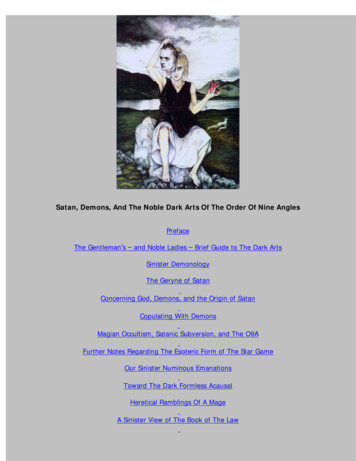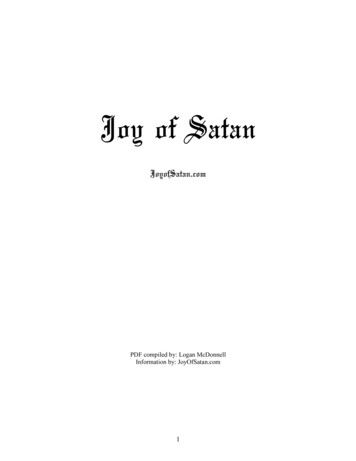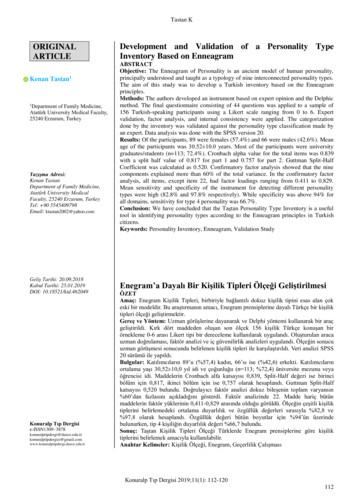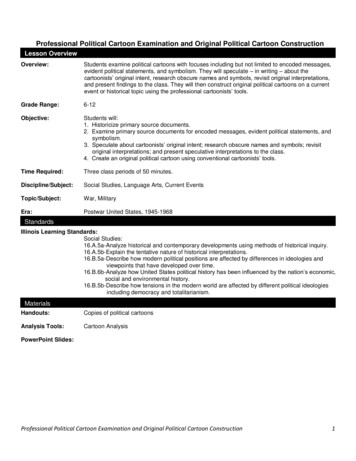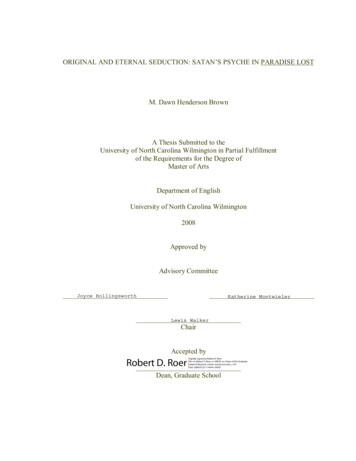
Transcription
ORIGINAL AND ETERNAL SEDUCTION: SATAN’S PSYCHE IN PARADISE LOSTM. Dawn Henderson BrownA Thesis Submitted to theUniversity of North Carolina Wilmington in Partial Fulfillmentof the Requirements for the Degree ofMaster of ArtsDepartment of EnglishUniversity of North Carolina Wilmington2008Approved byAdvisory CommitteeJoyce HollingsworthKatherine MontwielerLewis WalkerChairAccepted byRobertD. RoerDigitally signed by Robert D. RoerDN: cn Robert D. Roer, o UNCW, ou Dean of the GraduateSchool & Research, email roer@uncw.edu, c USDate: 2008.05.20 11:44:42 -04'00'Dean, Graduate School
TABLE OF CONTENTSABSTRACT. ivACKNOWLEDGMENTS .vDEDICATION .viINTRODUCTION. 1SECTION ONE. 4Psychoanalysis of Original Sin .4God: Milton’s Constant .12From Lucifer to Satan .13Man .22Adam .23Eve .27SECTION TWO .30Satan’s Seduction and Man’s Susceptibility .30THESIS CONCLUSION .45BIBLIOGRAPHY .50ii
ABSTRACTReligion and psychoanalysis share similar difficulties in literary application andanalysis. Both are relevant and dependent on readers and their personal experience. JohnMilton’s Paradise Lost is a blend of religious interpretation and a progressivepsychoanalytic journey for both the characters and readers. Milton asserts his intention isto justify the ways of God to man by explaining man’s first disobedience, but he takes anunexpected approach by developing Satan as the primary character. Using the Genesistradition Milton develops a fictional story that provides the reader insight into the mind ofthis infamous foe of man. Applying psychoanalytic theory and techniques to theevaluation of Satan’s developing psyche allows the reader to understand the complexapproach of seduction and ultimately reveals and explains man’s susceptibility to sin.iii
ACKNOWLEDGMENTSMy husband Dan, who met me after I started this graduate program, and has beenforced to put up with a full time student ever since.Dr. Frank Vaughn of Campbell University, my undergraduate mentor, lifelongfriend, and the individual who first introduced me to Paradise Lost with an academicpassion and appreciation second to none.The UNCW English Department, my wonderful thesis committee, and thePR3000 section of Randall Library.Dr. Lewis Walker has played a key role in my development as a scholar. I amtruly honored to have studied Renaissance Literature under him and will continue toreference and apply his knowledge to the development of this interest for years to come.His expertise and passion for literature are seen in every aspect of his job. Often this joywas contagious and almost medicinal to a struggling graduate student.Dr. Katherine Montwieler opened my mind to a new direction. When I walkedinto my first graduate class I had a very strong opinion on literature and theory and I amnow graduating realizing those opinions stemmed from narrow exposure. If she had notquestioned and challenged me to reexamine the reasons for my analyses I could havenever explored this topic.iv
DEDICATIONFor my parents, LeRoy and Susan Henderson who have no interest in readingParadise Lost but have devoted much time, energy, and love in helping me achieve thisdegree. You always told me I would never know it all, but believe I am capable oflearning anything.v
INTRODUCTIONIn a proud and bold voice John Milton’s Paradise Lost attempts to explain thecauses and origins of evil. The following thesis will explore this concept much moreclosely and look at the moment of original sin and its effects on Satan’s psychologicalstate. Through the examination of his psyche, the reason(s) of man’s seduction will beconsidered. I contend that the seduction of man is undertaken in Milton’s narrativepurely for the sake of maintaining Satan’s own disillusion that begins developing themoment after original sin occurs.The story of man’s creation can be found in many religions, with variations basedon values and customs. Milton found his own beliefs in the Protestant Christian traditionand the account established in Genesis. In fact, the biblical account already reflectssimilar elaboration. However, his interpretation of Man’s creation was not meant tointroduce a new version of the widely accepted story. Scholars have detected severaldifferent voices of storytellers in the book of Genesis. Milton is not only expanding thisshort story, but he is more importantly giving voices to the well-known characters andallowing them to develop individual psyches. This becomes problematic since Satan is sobriefly referenced in the biblical book but acts as the primary character in Paradise Lost.Satan is only presented in animal form in Genesis and little is known about what mighthave happened prior to his encounters in the Garden of Eden. Although Adam and Eveare biblically and historically associated with original sin, Satan’s internal rebellion -theinstant his mind seduces his soul- is the origin of all sin. The story of man’s fall takesplace merely a result of this moment. For this reason Milton must establish Satan as a1
multi-dimensional character to better demonstrate the many influences on the ultimatefall of Man.The chief difficulty facing many readers is finding a motive for Satan’srebellion. For Milton, the motive must be neither too good nor too bad. If it was toogood, God would seem unjust; if it was too bad, the Devil would seem silly. J.W. Evansbelieved that to a poet of Milton’s sensibilities the literary implications of the secondconclusion must have seemed no less abhorrent than the theological implication of thefirst, for he took great pains to avoid either (Evans 223). The task of explaining an entirephysical and moral system is not attempted in today’s literature. Modern authors andtheologians use a “divide and conquer” approach because they believe the world is toocomplex for a single work or theory to explain. Success of the following thesis assertionsand explanations are somewhat dependent on whether you accept the Christian worldview and at times, the individualized view of Milton. Satan’s motives undergo aremarkable transformation during the course of the poem. At first glance both therebellions against God and the temptation of Man appear to be grounded on essentiallyheroic values: pride, defiance, and revenge. Yet, later, they seem to stem from a moreignoble source: envy. Evans has suggested that they are organized in such a way that theproud antagonist of God soon gives way to the jealous rival of the Son and ultimately tothe envious tempter of Man (Evans 241).Jealousy, envy, and pride are all words that carry a deeper and stronger meaningthan many readers are accustomed to applying. Psychoanalysis explores the internalizedconditions that lead to these emotions. Once the psyche is acknowledged as having apresence in a work of literature, then the individual influences can be recognized and2
ultimately change the way a reader views a character. In relation to the purpose of thisthesis, the revelations psychoanalysis affords show why Satan chooses to act as he does,and more importantly what causes him to act in ways he himself cannot explain. In thisanalysis it will be equally necessary to examine the mental states of characters withwhom Satan interacts, to determine what makes them susceptible and how theseencounters direct the growth and development of Satan’s psyche and his ensuing selfdelusion.Certain Freudian terms and concepts will be useful for this analysis. Religion,according to Freud, is an obsessive neurosis or alternately an infantile projection onto acreated father image. Freud’s exposition of the unconscious determinants of human actschallenges former assumptions regarding moral freedom (MacIsaac 5). Freud’sreferences to “man’s” sin, and his frequent evocations of the unconscious war betweensin and morality, can be connected to Satan’s first immoral act. The point of originalseduction and Satan’s continual revisiting of this moment provides the foundation toconnect the many events, dialogues, and times revealed non-sequentially throughout thetext.3
SECTION ONEPsychoanalysis of Original SinParadise Lost is not written chronologically, which is its own double-edgedsword. The organization of events within the twelve books jumps back and forth in timeand place allowing the author to establish characters, perspectives, and expectations thatlinear writing would often prohibit. To compensate for this difficulty, physical location isused to make the changes in time seem less drastic. Throughout Paradise Lost location isfrequently depicted through rhetoric. Characters, especially Satan, are often placed inone setting while describing another and become so consumed with mental pictures andexpectations they are unable to separate the tangible prospects of their currentsurroundings from internalized scenes. The split setting also acts as a contributing factorin the division of various roles each fallen character will inevitably play. Psychoanalysisconsiders setting influential on both the externalized emotions and the internal dialogue.Understanding a character’s history, associations, and feelings with regard to a specificlocation opens the door to a deeper analysis of their reactions and conversations. Theonly character in Paradise Lost who physically experiences all three of its settings,- Heaven, Earth, and Hell - is Satan. While God is considered omnipresent, and Adam istold about Heaven and Hell, they are incapable of analyzing all three dimensions fromwithin. Thus the reader has the difficult task of discerning truths from Satan’smanipulative descriptions. John Shawcross gives us a view of the complexity of settingsto which Satan reacts:Despite the three locations of Heaven, Hell, and Earth we see the first twoin contrast to each other or in relation to the third. The first half of the4
poem takes the reader from Hell in Books I, II to Heaven in Book III, andto Earth in Book IV. Still on Earth in Books V, VI, the content primarilydepicts Heaven. Balancing the first half, the last four books are devoted tothe creation of Earth in VII (thus contrasting with the creation of Hell inBooks I, II), to the loss of Paradise on Earth in Book VIII (thus contrastingwith the creation of Hell in Books I, II), to the loss of Paradise on Earth inBook VIII (thus contrasting with the idyllic Earth in Book IV), and to thefuture sinfulness of the Earth in Book X (thus contrasting with the earlieraction in Heaven in Books V, VI). (45)Satan’s varying experiences in these contexts all contribute to the growth and devolutionof his psyche. One of the chief ways in which Milton conveys a sense of all theserelocations, is through the description of ascent and descent. This thread of imagery isdeeply ingrained in the poem and is instrumental in the account of Adam and Eve’s falland redemption. This type of movement between different times and locations makes itdifficult to see subtle shifts in relationships and mental states. However, it has its greatestimpact in tracing Satan’s physical and his psychological movement.Although Adam and Eve never reside outside of the earthly realm, theyexperience descriptions and references to unseen locations they cannot fully fathom. As aresult, psyche builds around the assumptions they make without full knowledge,eventually making them Satan’s ideal target for manipulation and the ensuing seductioninto their first sin. As Satan targets Man Milton attempts to bring his readers to a pointof revelation by also subjecting them to rhetorical seduction. Milton attempts to explain“Man’s First Disobedience,” but to do this he must first present a perfect Adam and Eve.5
Some readers of the poem may feel that the first couple are not perfect, that they displayobvious defects or at least vulnerabilities. This perception, however, may arise from thereaders’ being further along in their experience of worldly fallenness than Adam and Eve.Interestingly, many critics who claim Milton established flawed characters fail toacknowledge that Milton and his readership are themselves flawed.When theindividual steps back and examines his own life, he does not review the past by mentallyflipping backwards through a preverbal photo album. Psychoanalysis accepts the brokensequence of one’s life as a legitimate text for examination. The disordered sequenceutilized by Milton allows the reader to progress through the story in a manner similar tothe way a patient would undergo a psychoanalytic evaluation.Psychoanalysis is based on the study of desires, whether they are recognized ornot. Desires come from an infantile state, the need to fill a void left by deficiencies in aparental-style relationship. Sometimes the void simply reflects an unanswered questionwhile other voids come as irreconcilable relationships, the end result of conflictingdesires. With these desires comes the need to resolve conflicts through the difficultstruggle and ultimate achievement of self discovery. All individuals experience their firstconflict with their parents as they develop from children to adults. Milton explores thiskind of child-parent tension sporadically, presenting characters that are alreadysubmerged in conflict and slowly divulging the preceding events and influences throughsoliloquies, recollections, and conversations. Considering this familial connections inthe light of psychoanalytic theory, the reader must be aware of the relationships betweenGod and the other characters who are interchangeably referenced as his creations orchildren. Man, angels, and the fallen angels, who have since become demons, were all6
created for the purpose of glorifying the Creator, according to the traditionalinterpretation. Some critics, misconceiving psychoanalysis, have argued that Satancomes across as the protagonist of the work because God seems weak and unable tocreate or maintain perfection. This line of analysis is similar to the old idea of punishingthe parent for the child’s sin. As one critic puts it, “If the motive Milton gave hischaracters should make them flawed from the beginning, then Milton’s God is to blamefor flawed creation, and the author has failed to ‘justifie the ways of God to men’”(Musacchio 1). However, God is not to blame for Satan’s fall, or the ensuing fall of man.Satan may appear in a more favorable light because Milton has to use human terms todescribe God. In any case, Milton seems to have gone to great lengths to develop hischaracters in a way that allows God to remain supreme authority–an all powerful parentfigure-without becoming a puppet master. As Satan is flying toward Earth, Godcomments on the eventual fall of man, highlighting his allowance of free will.To understand the psychology behind original sin and the ensuing fall of man, onemust understand the hierarchy of the characters. God is the highest with the angelsfollowing suit. Man comes after the angels and is followed by the beasts and plants.Within each level there is a specific order. In Heaven, angels are lower than God andanswer to his orders. The same principles are found on Earth. Adam has the closerrelationship with God, so Eve gains her knowledge from him. The psychology of thepoem is about the violation of the order, first by Satan, then by Eve, and finally by Adam,who places Eve before God. These violations stem from desires for power (Satan),knowledge (Eve), and companionship (Adam), all which will be explored individually inthe following section.7
The guiding principle of psychoanalysis assumes that the concept of knowingoneself requires the individual to recognize the existing unconscious and deal with itsunknown influences through retrospection. It is assumed that the unrecognized pressureswill not lead one to act in a way detrimental to oneself and others. Another importantelement of psychoanalytic theory also may be used for our purposes: “Freud coined theterm ‘Oedipus complex’ to describe the welter of ideas, emotions, and impulses, alllargely or entirely unconscious, that centers on the relations a child forms to his parents”(Bettelheim 20). The myth of Oedipus is one of humanity’s oldest stories. It existed as afolktale in ancient times, was passed along in oral tradition, and was written down byclassic poets. Since its formulation by Freud it has spawned a tradition of psychologicalintrospection. The most definitive Oedipus story is Sophocles’ Oedipus Tyrannus, thechannel through with the myth comes to Freud. In this version, Oedipus leaves his homeafter an oracle predicts he will murder his father and marry his mother. He then arrives inThebes where he defeats the great Sphinx, is crowned king, and takes the widowed queenJocasta as his wife. Many years later Oedipus, attempting to rid the city of plague,discovers that the king, Laius, was murdered by his own hand before he came to Thebes.He then learns he is also the son of Laius and Jocasta, which shows that he has ultimatelyfulfilled his role in the prophecy.Therefore, all that is needed to begin applying Freudian theory to Milton’s work isthe term “Oedipus complex,” which brings to mind an extensive range of metaphors andscenarios that operate in an unknown state. The first love-object for all of us is ourmother. We want her attention, we want her affection, we want her caresses, we want herin a broadly sexual way. The young boy, however, has a rival for his mother's charms: his8
father. His father is bigger, stronger, smarter, and he gets to sleep with mother, whilejunior pines away in his lonely little bed thus slowly, and often unconsciously allowingDad to become the enemy (Boree 1).Although there was no official Oedipus theory in Milton’s time, he would havebeen aware of the story, so it is not a stretch to find similarities between Oedipus and hisencounters and those of Satan in Paradise Lost. Sophocles begins Oedipus Tyrannus longafter the events prophesied by Apollo have already taken place. For both Milton andSophocles, it would have been easy to merely retell the stories in a straightforward style,but they refrain. Sophocles is more interested in exploring Oedipus after he has alreadycommitted his outrageous sin of murdering his father and marrying his mother. Thisversion of the myth is more about what Oedipus does once he is in that situation.Likewise, the story of man’s fall already had a historic base from the Genesis traditionand all the beliefs developed from various schools of thought. Satan is already in serpentform in the book of Genesis, but Milton steps back from the fall of man and purposefullyopens with Satan in his newly fallen state, before he has become a serpent. The fall ofman then becomes a result of Satan’s actions after he, like Oedipus, has alreadycommitted his outrageous sin. In the end, there are only two characters in Sophocles’,Oedipus and Jocasta, who act on their own. Similarly, Milton’s God and Satan are theonly two who act without guidance, seduction, or manipulation of others. Sophocles’other characters, such as Creon, and Milton’s Adam and Eve, do not function withoutbeing told what to do. While freewill is present to all, the psyches of these individualsare in a state that is dependent on guidance and instruction. Multiple moments in Milton’swriting seem to reflect various psychological aspects of the ancient myth. God banishes9
Satan, but this malevolent prodigal son is determined to return to his true “home” byachieving equivalent power. Satan seeks to seduce his fellow creatures, and althoughthey are not created in equal states, they could be viewed as siblings. Bruno Bettleheimobserves that both stories rely on the unconscious deeds, wishes, aggressions, andanxieties remaining unknown. As long as they are hidden they can continue to exert theirdestructive power (Bettelheim 25). The actions of both Oedipus and Satan show theoutcomes of individuals’ actions when they are driven by unconscious pressures.In this perspective God is the father to the angels and man. It is more difficult topinpoint Satan’s attachment to God. While it is fairly easy to compare his war with Godto the son’s penis envy described by Freud, God seems to continually shift back and forthbetween various fatherly roles. During various speeches through the poem the angelsAbdiel and Raphael reference Satan’s commitment to and adoration of God when he wasstill Lucifer. Overall, these references explore the transition between love and hate byrevealing the mental shifts associated with the emotional changes. First Satan wages warin Heaven, spurred by the new “Son” who has taken his place. Once this fails he willlater, in his fallen state, take on Man, his new rival for God’s attention. Ultimately thisshift in focus causes Satan to transition from a young boy who looks up to his father to apost-pubescent character who now views his father as competition.Freud believed that any emotional constellation can be converted to eroticism,and that this abnormality explains the tenacity of unwholesome and self-destructivecharacter traits. We may look to one of Freud’s interpreters for an example that serves toclarify the sensual development of destructive energy between parents and children, orfor Milton, God, and his creations:10
The punishment of children is all too often a sensual experience for parentand child alike. Once the child is reduced to tears and humiliation, theparent will accord it tenderness and intimacy. These latter moments havean unmistakably sensual aspect. Generally, with such parents the samesort of intimacy is not granted when the child is spirited. He is then bereftof intimate acceptance by the parent and this is a price too great for thechild to pay. (MacIsaac 81)It is not difficult to divide the characters of Paradise Lost into the categories listed above.God’s children, when taken out of the Sunday school context, would be either the goodchildren who stray, or the spirited children who stray but cannot regain the intimaterelationship with the estranged parent. Obviously the Son of God is the favored childwho will never do wrong. Satan and his legions of angels are the spirited children whofall so far out of the parent’s graces they can never return to his bosom. Perhaps to fillthe void left from the loss of children, and by extension to enjoy the glorification thatcomes with a parental role, God creates man, in his own image, to “replace” his fallenchildren. Satan begins to take his anger of abandonment out on God’s new children sincehe is unable to conquer his parent. He is obsessed with coming between the two, notbecause of hatred for Adam and Eve but because of the relationship, or lack thereof,between himself and God. The psychology behind this type of competition is theconnection between psychoanalysis and Milton.11
God: Milton’s ConstantMilton secures a positive response to the figure of God by creating apsychological need in the reader for the authority he represents. The psyches of all thecharacters seek or depend on the parental guidance a creator would presumably assume.He is the only figure that has an unchanging consciousness. Actions in the first twobooks are so unsettling that the reader’s confidence in his own powers has diminishedand the strongest voice has been that of Satan. Narrators are normally utilized to eitherkeep or return their audience to a state of comfort, but Milton’s narrator is disorienting, asStanley Fish points out: “There is of course the epic voice, but his reliability is largelynegative and hardly comforting, extending to what Satan is not, to what the human mindcannot do, to what cannot be trusted” (Fish 70). Milton depends on his audience to findcomfort after they complete a critical examination of their own beliefs. In the resultingstate of perplexity, the poem is all the more in need of someone readers could look to fordirection. The problematic status of the hero contributes to this crisis of authority.Much criticism has been devoted to labeling a hero of Paradise Lost. Thehistoric Christian perspective would naturally place God in this role, and we mightassume Milton would follow suit. There are difficulties in looking for other heroes. AsJohn Shawcross explains, “The question concerning the hero is really various questions:is there a hero in the poem? If there is, who is the hero? If there is no hero, how does oneview Satan? And the basic question, what does one mean by hero?” (Shawcross 33).Milton depends on predetermined beliefs and accepted education of readers to naturallyguide them toward God as the heroic force. A further assumption is that Paradise Lost isnot actually an epic, and therefore there is no need for an epic hero. If this holds true,Shawcross contends, the concept of hero for the poem must be different from that in the12
traditional epic. The hero in this case is not necessarily one of noble rank, fighting toovercome injustice and succumbing in the process, and his action and achievement neednot be exemplary. Milton’s God is strong yet ambiguous enough to fit into thisperspective. His hands-off approach allows him to interact with characters but leavethem with free will and distance himself from the psychological changes experienced bythe fallen. Each reader is, like Adam and Eve after the punishment, a fallen creature.Milton's treatment of the story thus succeeds because it forces the reader to recognize theprimary need for unquestioning faith.Milton’s God as is not as easy to identify, label, or understand as others in thepoem. He speaks, but only when an explanation or response is needed. For example, heexplains the need for a sacrifice in his speech to the angels after the fall because they donot understand or foresee the future of Man. Likewise, he responds to Adam’s requestfor a companion but does not initiate the idea. Milton achieves this by utilizing theaccepted theory of God’s omnipresent existence. God’s role is defined through the othercharacters’ reaction to and relationships with Him, and he unquestionably influences totheir psychological states. As in a scientific experiment, God becomes the constant.Since his psyche never changes, Milton has provided a basis for comparison for all thecharacters experiencing the fall.From Lucifer to SatanIndividuals change as they grow physically and mentally. Experiences andrelationships shift both the psyche and the person’s function in society. Role changes inParadise Lost seem simple and visible and could easily be disregarded as surface facts.However, each role that the mind settles into comes with its own subconscious13
motivations and baggage. Due to the broken chronology of Milton’s poem, many subtlefacts and suggestions often fall to the wayside due to reader’s inability to makecontinuous connections across various times and locations. One of the most notableinstances of Milton’s nuanced approach is the use of names. Milton takes great care touse the name “Satan” during any scene occurring after the fall. In the beginning heintroduces Satan in Hell and establishes his character as a fallen foe. Likewise, “Lucifer”is only associated with the Heavenly scenes, before and during the rebellion, but readersare already accustomed to Satan and the connotations which come with the name. Freudbelieved it was possible for a person to have multiple sides to their personality. From apsychoanalytic perspective, the two names –Satan and Lucifer - point toward a state ofinternal duality that will continue to compete long after the external has fully embodiedone of the states. The mind may repress but can never erase its past; therefore, there willalways be subconscious influences from previous experiences competing with presentscenarios.Milton deliberately makes Satan attractive to remind the reader of the seductiveappeal of sin, especially pride. Satan is introduced as the fallen child, eternally disownedby God. The key element in his ability to fight against this stigma, exist in the legions offallen angels who share his fate. Since he is not alone, it is easier for his psyche torationalize his current state. In Books I and II Satan has already fallen, but his new formis difficult to picture. Although he makes references to the greatness and beauty he oncepossessed as Heaven’s brightest angelic light, his oratorical skills quickly shift focusfrom his now diminished image to his new plan. The epic voice makes an unmistakablereference in Book I
John Milton s Paradise Lost is a blend of religious interpretation and a progressive psychoanalytic journey for both the characters and readers. Milton asserts his intention is to justify the ways of God to ma


